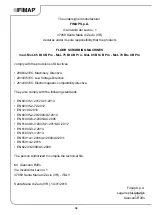
Before performing any routine or extraordinary maintenance operation, proceed as follows:
1. Take the machine to the maintenance area.
N.B.:
the place given over to this operation must comply with current environmental protection regulations.
2. Make sure the machine is in a safe condition (see chapter “
”).
CAUTION:
it is recommended to wear the appropriate PPE (Personal Protective Equipment), suitable for the work to be carried out.
CLEANING THE SQUEEGEE BODY
The careful cleaning of the whole vacuum unit ensures better drying and cleaning of the floor as well as a longer suction motor life. To carry out
the cleaning of the squeegee body, proceed as follows:
1. Remove the vacuum hose (1) from the vacuum nozzle (2) on the squeegee unit (
Fig.1
).
2. Completely unscrew the knobs (3) on the squeegee body pre-assembly (
Fig.2
).
3. Remove the squeegee body from the slits in the squeegee connector.
4.
Thoroughly clean the squeegee body vacuum chamber (4) with a jet of water, and then with a damp cloth (
Fig.3
).
N.B.:
The place given over to this operation must comply with current environmental protection regulations.
5.
Thoroughly clean the squeegee body rear rubber blade (5) with a jet of water, and then with a damp cloth (
Fig.4
).
6.
Thoroughly clean the squeegee body front rubber blade (6) with a jet of water, and then with a damp cloth (
Fig.5
).
7.
Use a jet of water and then a damp cloth to thoroughly clean the vacuum nozzle (7) (
Fig.6
).
8. Proceed in the opposite order to reassemble all the parts.
N.B.:
Check the wear of the rear rubber blade (5) on the squeegee body; if the edge of the rubber in contact with the floor is worn, replace
REPLACING THE SQUEEGEE BODY RUBBER BLADES
".
N.B.:
Check the wear of the front rubber blade (6) on the squeegee body; if the edge of the rubber in contact with the floor is worn, replace
REPLACING THE SQUEEGEE BODY RUBBER BLADES
".
CLEANING THE DEBRIS HOPPER (SWEEPING VERSION)
To clean the debris hopper, proceed as follows:
1. Use the moulded handle to extract the debris hopper (8) (
Fig.7
) and empty it.
N.B.:
The place given over to this operation must comply with current environmental protection regulations.
2.
Clean the inside with a jet of water, and use a brush to remove any residual impurities if necessary.
3. Proceed in the opposite order to reassemble all the parts.
CLEANING THE BRUSH HEAD BRUSHES (SCRUBBING VERSION)
Careful cleaning of the brush guarantees better cleaning of the floor, as well as a longer brush head gearmotor lifespan. To clean the brush,
proceed as follows:
1. Go to the front of the machine.
2. Press the brush-holder plate retainer (9) and simultaneously rotate the brush in the direction shown in the image (
Fig.8
).
ATTENTION:
Fig.8
shows the rotation direction of the left-hand brush.
3. When brush rotation is prevented, turn until the button on the brush is disengaged from the coupling spring on the brush-holder plate.
4. Repeat the same operation for the right-hand brush.
5. Clean the brush under running water to remove any impurities from its bristles.
6. See “
INSTALLING THE BRUSH (SCRUBBING VERSION)
” for instructions on refitting the brushes in the brush head body.
N.B.:
Check that the bristles are not worn; in the event of excessive wear, replace the brush (the bristles should be at least 10 mm long).
REPLACING THE BRUSH (SCRUBBING VERSION)
CLEANING THE BRUSH HEAD BRUSHES (SWEEPING VERSION)
Careful cleaning of the brush guarantees better cleaning of the floor, as well as a longer brush head gearmotor lifespan. To clean the brush,
proceed as follows:
1. Go to the front of the machine.
2.
Remove the knobs (10) that fix the left-hand side carter (11) in place by turning anti-clockwise (
Fig.9
).
3. Remove the left lateral carter (11) (
Fig.10
).
4. Extract the brush from the tunnel (
Fig.11
).
5. Repeat the same operation for the right-hand brush.
6. Clean the brush under running water to remove any impurities from its bristles.
27










































